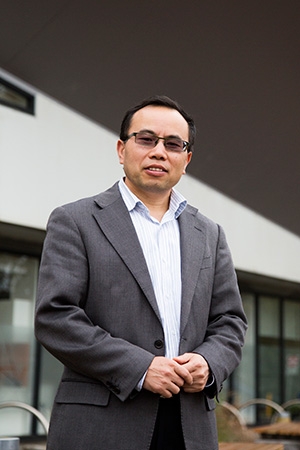Institute to boldly explore new frontiers
Research news
When Professor Xungai Wang joined Deakin 16 years ago, he was the first fibres researcher at the University. Now, Deakin's Institute for Frontier Materials (IFM) is world class - and one of the biggest research institutes in Australia - and Professor Wang is its new Director.
The IFM now supports over 300 people, a 50:50 mix of staff and PhD students.
Professor Wang has taken the helm at IFM from Professor Peter Hodgson, who oversaw its flourishing from humble beginnings in the late 1990s and is now turning his energies to building large-scale research collaborations for Deakin.
Originally from China, Professor Xungai Wang joined Deakin from the University of NSW in 1998 and has been intimately involved with the IFM as its Deputy Director and through his own cutting edge research in the fibres area.
He has covered the spectrum of fibres research, from enhancing silk, cotton and wool for the textiles industry, to developing novel materials for biomedical use, whether this be stent design or assisting tissue regeneration.
Prof Wang attributes the "phenomenal" success of the IFM to a mix of excellent researchers and support staff, a dynamic director, "who provided tremendous support and leadership," and Deakin's foresight in identifying the importance of new materials to the modern world.
"When I joined Deakin, my research interest was in natural fibres, such as cashmere, alpaca and wool," said Professor Wang.
"While fibres like wool and cotton are still very important - contributing around $4 billion to the Australian economy annually - the IFM is equally involved in new fibres such as carbon fibre and nanofibre that are transforming the way we live."
"Developing the next generation of materials is very important for Australia and internationally," he added. "The IFM has a major focus on future manufacturing and helping Geelong and Australia to make the transition to high value added advanced manufacturing."
"Also, apart from manufacturing, our research is concerned with very significant applications in areas such as environmental sustainability, health and energy."
He emphasised that the IFM is not just about fibres, but has become a world leader in metals and steel research, electromaterials, corrosion, nanotechnology and composite materials.
Professor Wang explained that the IFM is looking to collaborate more closely with local industries and world-leading research institutions, to drive its research further, with a particular focus on innovative manufacturing technologies, and materials for energy and resource efficiency and infrastructure durability.
"In the fibre materials area, we have the world's best university carbon fibre facility at Carbon Nexus, and we are looking to consolidate our position as a world leader in nanofibre as well," he noted.
The Institute already has strong relationships with local industries and the CSIRO, which have been nurtured by the Geelong Technology Precinct (GTP) at the Waurn Ponds Campus. Through the GTP, Deakin now works with Australia's largest independent manufacturer of carbon fibre composites, Quickstep, and businesses such as HeiQ Australia, Cytomatrix and Carbon Revolution, which are all co-located at the site.
With his passion for research and excitement at the possibilities of new materials, Professor Wang is just as determined to make his mark on the IFM as his predecessor.
"Leveraging our research skills to help grow Australian businesses is an important part of our mission," he said.
"The best way for us to attract businesses is by being excellent at what we do. By staying connected with local industry and with the best researchers in the world - and underpinning our research with world-class facilities - we can make a difference."
Share this story
 Professor Xungai Wang.
Professor Xungai Wang.
